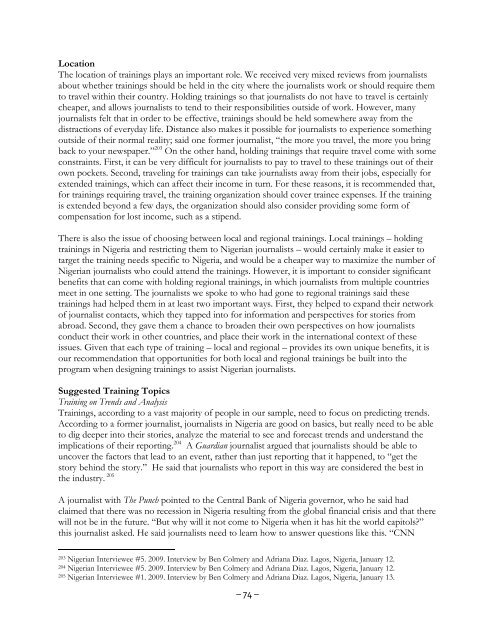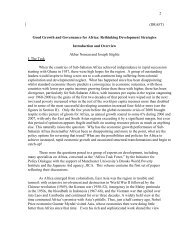THERE WILL BE INK - Initiative for Policy Dialogue
THERE WILL BE INK - Initiative for Policy Dialogue
THERE WILL BE INK - Initiative for Policy Dialogue
You also want an ePaper? Increase the reach of your titles
YUMPU automatically turns print PDFs into web optimized ePapers that Google loves.
LocationThe location of trainings plays an important role. We received very mixed reviews from journalistsabout whether trainings should be held in the city where the journalists work or should require themto travel within their country. Holding trainings so that journalists do not have to travel is certainlycheaper, and allows journalists to tend to their responsibilities outside of work. However, manyjournalists felt that in order to be effective, trainings should be held somewhere away from thedistractions of everyday life. Distance also makes it possible <strong>for</strong> journalists to experience somethingoutside of their normal reality; said one <strong>for</strong>mer journalist, “the more you travel, the more you bringback to your newspaper.” 203 On the other hand, holding trainings that require travel come with someconstraints. First, it can be very difficult <strong>for</strong> journalists to pay to travel to these trainings out of theirown pockets. Second, traveling <strong>for</strong> trainings can take journalists away from their jobs, especially <strong>for</strong>extended trainings, which can affect their income in turn. For these reasons, it is recommended that,<strong>for</strong> trainings requiring travel, the training organization should cover trainee expenses. If the trainingis extended beyond a few days, the organization should also consider providing some <strong>for</strong>m ofcompensation <strong>for</strong> lost income, such as a stipend.There is also the issue of choosing between local and regional trainings. Local trainings – holdingtrainings in Nigeria and restricting them to Nigerian journalists – would certainly make it easier totarget the training needs specific to Nigeria, and would be a cheaper way to maximize the number ofNigerian journalists who could attend the trainings. However, it is important to consider significantbenefits that can come with holding regional trainings, in which journalists from multiple countriesmeet in one setting. The journalists we spoke to who had gone to regional trainings said thesetrainings had helped them in at least two important ways. First, they helped to expand their networkof journalist contacts, which they tapped into <strong>for</strong> in<strong>for</strong>mation and perspectives <strong>for</strong> stories fromabroad. Second, they gave them a chance to broaden their own perspectives on how journalistsconduct their work in other countries, and place their work in the international context of theseissues. Given that each type of training – local and regional – provides its own unique benefits, it isour recommendation that opportunities <strong>for</strong> both local and regional trainings be built into theprogram when designing trainings to assist Nigerian journalists.Suggested Training TopicsTraining on Trends and AnalysisTrainings, according to a vast majority of people in our sample, need to focus on predicting trends.According to a <strong>for</strong>mer journalist, journalists in Nigeria are good on basics, but really need to be ableto dig deeper into their stories, analyze the material to see and <strong>for</strong>ecast trends and understand theimplications of their reporting. 204 A Guardian journalist argued that journalists should be able touncover the factors that lead to an event, rather than just reporting that it happened, to “get thestory behind the story.” He said that journalists who report in this way are considered the best inthe industry. 205A journalist with The Punch pointed to the Central Bank of Nigeria governor, who he said hadclaimed that there was no recession in Nigeria resulting from the global financial crisis and that therewill not be in the future. “But why will it not come to Nigeria when it has hit the world capitols?”this journalist asked. He said journalists need to learn how to answer questions like this. “CNN203 Nigerian Interviewee #5. 2009. Interview by Ben Colmery and Adriana Diaz. Lagos, Nigeria, January 12.204 Nigerian Interviewee #5. 2009. Interview by Ben Colmery and Adriana Diaz. Lagos, Nigeria, January 12.205 Nigerian Interviewee #1. 2009. Interview by Ben Colmery and Adriana Diaz. Lagos, Nigeria, January 13.– 74 –














